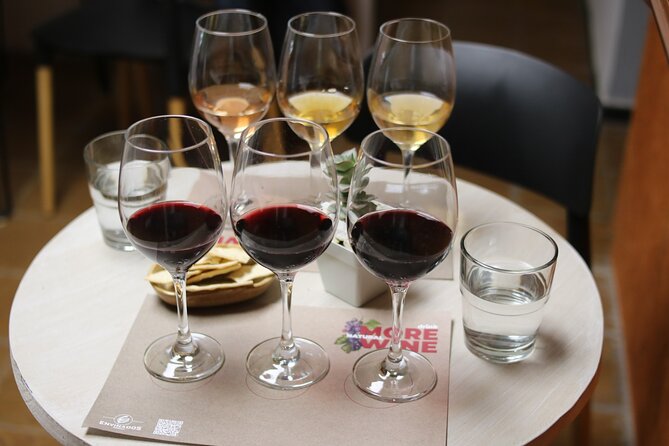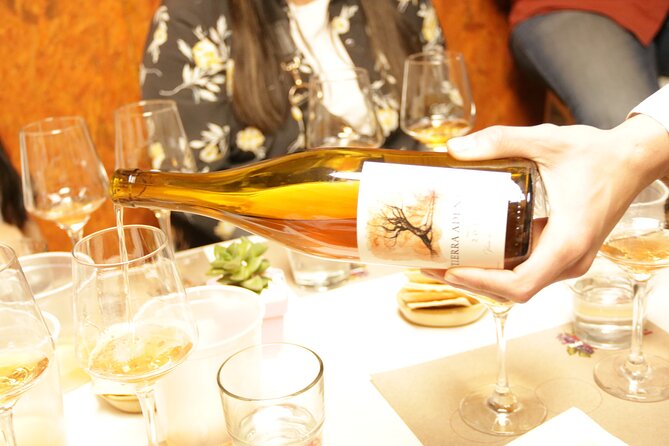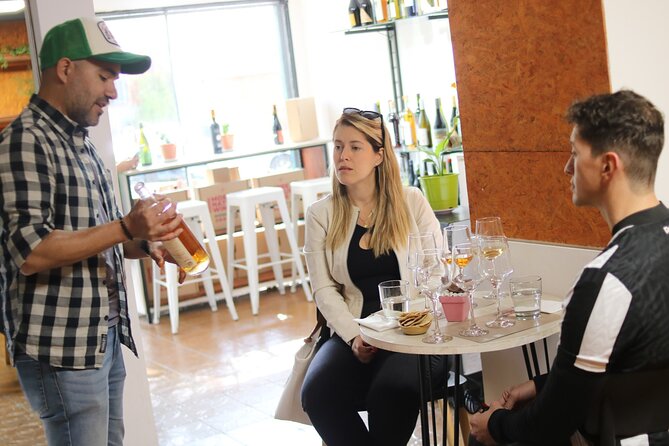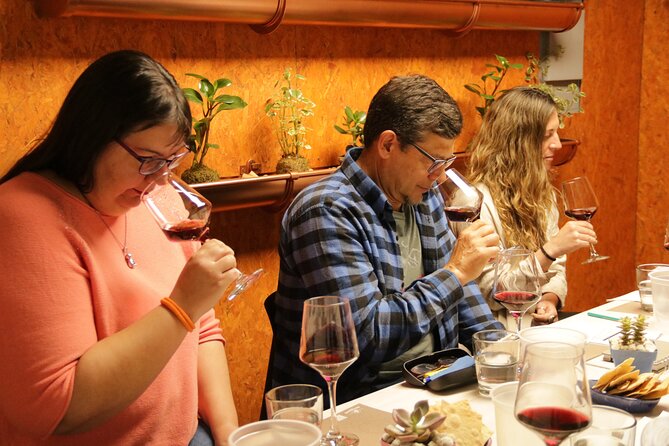Explore the diverse world of sustainable wines in this informative tasting class. Discover the unique qualities and production methods behind organic, biodynamic, and natural varietals. Through hands-on tastings, you will learn to identify distinct flavor profiles, understand the principles of eco-friendly viticulture, and appreciate the craftsmanship that goes into each bottle. Whether you’re a seasoned wine enthusiast or new to the world of sustainable libations, this class offers a compelling introduction to the remarkable flavors and environmental benefits of these consciously-crafted wines. Prepare to expand your palate and broaden your understanding of the wine industry’s shift towards a healthier, more sustainable future.
This experience made our list of the 3 Best Workshops And Classes In Mendoza.
About Your Stay

- Explore the sensory profiles of organic, biodynamic, and natural wines, highlighting unique characteristics like minerality, earthiness, and fruit intensity.
- Understand the principles of sustainable viticulture and its benefits, including soil health, biodiversity, and the expression of regional terroir.
- Learn to identify and appreciate the differences between conventionally produced wines and those made using organic, biodynamic, or natural methods.
- Discover the winemaking heritage and regional expressions of notable grape varieties from Argentina, such as Malbec, Cabernet Sauvignon, and Torrontés.
- Develop skills in pairing organic, biodynamic, and natural wines with local, seasonal foods to create harmonious flavor combinations.
What Is Organic Wine?
Organic wine is produced from grapes grown without the use of synthetic pesticides, fertilizers, or other chemicals. This minimizes the environmental impact and results in a more natural, unadulterated wine.
Organic winemakers focus on promoting soil health and biodiversity, often using sustainable farming practices like cover cropping and natural pest management. The lack of synthetic additives means organic wines may have a more distinct, terroir-driven flavor profile.
While organic certification can vary by region, the general aim is to create wines that are healthier for both consumers and the planet. Many wine enthusiasts appreciate the authenticity and purity of organic wines as part of a broader shift towards conscious consumerism.
You can also read our reviews of more food & drink experiences in Mendoza
Understanding Biodynamic Winemaking

Building upon the foundations of organic winemaking, biodynamic viticulture takes a more holistic approach to grape growing and wine production.
Biodynamic methods embrace the interconnectedness of the vineyard ecosystem, utilizing natural preparations and rhythms of the moon and planets to guide planting, pruning, and harvesting. This results in wines that express a true sense of terroir, with balanced acidity, complex flavors, and a vibrant, energetic character.
Biodynamic practices avoid synthetic chemicals, instead promoting biodiversity and self-sustaining soil health. While requiring more labor-intensive management, the biodynamic approach is prized by winemakers seeking to craft wines that are authentically reflective of their origin.
Exploring Natural Wine Varieties

Natural wines encompass a diverse array of varietals that celebrate the unique characteristics of each grape and terroir.
From full-bodied Malbecs to crisp Torrontés, natural wines offer a delightful exploration of Argentina’s winemaking heritage.
Some key natural wine varieties to look for include:
-
Malbec: Known for its rich, velvety texture and flavors of dark berries and spice.
-
Cabernet Sauvignon: A bold, structured red with notes of black currant and cedar.
-
Torrontés: A refreshing white varietal with floral aromas and a lively acidity.
These natural wines provide a truly authentic taste of the region, reflecting the individual expression of the land and the winemaker’s craft.
Tasting Notes and Flavor Profiles

The wine tasting class delves deep into the sensory experience of organic, biodynamic, and natural wines, guiding participants through the nuanced flavors and aromas that define each varietal.
From the crisp, minerally notes of a natural Sauvignon Blanc to the rich, earthy complexity of a biodynamic Pinot Noir, the session explores the unique profiles that set these sustainable wines apart.
Participants learn to identify key characteristics like acidity, tannins, and fruit intensity, developing a discerning palate that can appreciate the subtle differences between conventional and natural winemaking approaches.
Benefits of Sustainable Viticulture
Sustainable viticulture practices offer a host of benefits that resonate with environmentally-conscious wine enthusiasts. These practices promote soil health, reduce chemical usage, and enhance biodiversity.
Firstly, organic and biodynamic farming methods nourish the soil, improving its fertility and water-holding capacity.
Secondly, the minimal use of synthetic pesticides and fertilizers protects local ecosystems and ensures the grapes’ natural flavors shine through.
Lastly, supporting diverse plant and wildlife on vineyards fosters a balanced, resilient ecosystem.
Ultimately, sustainable viticulture aligns with the growing demand for eco-friendly products, making these wines an appealing choice for conscious consumers.
You can also read our reviews of more wine tours in Mendoza
Selecting Organic Wine Producers
When selecting organic wine producers, one should prioritize those that go beyond the basic certification requirements.
Look for wineries that utilize biodynamic farming methods and employ sustainable practices throughout their operations. These holistic approaches often result in wines of exceptional quality and character.
Plus, seek out producers who are transparent about their processes and readily share information about their growing and production methods.
By supporting organic and biodynamic wineries, consumers can enjoy delicious wines while promoting environmentally-friendly viticulture.
Ultimately, careful selection of organic wine producers ensures a rewarding tasting experience and positive environmental impact.
Pairing Organic Wines With Food
Pairing organic wines with food requires a thoughtful approach, as their distinctive flavors and nuanced profiles warrant careful consideration.
When selecting food pairings, consider the following:
-
Match the body and intensity of the wine with the richness of the dish. Light, delicate organic wines pair well with simple, fresh fare, while bold, tannic reds complement heartier meals.
-
Emphasize complementary flavors. For instance, the earthy notes in a biodynamic Malbec can enhance the umami in grilled meat, while the bright acidity in a natural Sauvignon Blanc can cut through creamy sauces.
-
Experiment with local, seasonal ingredients to create synergies with the regional terroir expressed in the organic wines.
Discovering Mendoza’s Wine Culture
Nestled in the heart of Argentina’s renowned Cuyo region, the city of Mendoza has long been celebrated as a premier destination for wine enthusiasts. The region’s unique microclimate, characterized by an abundance of sunshine, cool nights, and ample irrigation from the Andes Mountains, produces exceptional wines that showcase the terroir. To fully take in Mendoza’s vibrant wine culture, the organic, biodynamic, and natural wine tasting class offers an unparalleled opportunity.
| Mendoza Wine Region | Key Features |
|---|---|
| Climate | Sunny, cool nights, Andean irrigation |
| Soil | Alluvial, well-draining |
| Grape Varieties | Malbec, Cabernet Sauvignon, Torrontés |
| Wine Styles | Bold reds, aromatic whites, rosés |
| Sustainability | Organic, biodynamic, natural practices |
Questions About Your Stay
Can I Bring My Own Wine to the Tasting?
No, you can’t bring your own wine to the tasting. The class includes alcoholic beverages, so the host provides the wines for the participants to sample during the tasting session.
Is the Class Suitable for Beginners or Experts?
The class is suitable for both beginners and experts. It provides an informative wine tasting experience, with the host proficient in English and Spanish, catering to a range of wine knowledge levels.
What Is the Dress Code for the Tasting?
The class does not have a strict dress code, but participants should wear comfortable, casual attire. Smart casual or business casual is appropriate, as the focus is on the wine tasting experience rather than formal attire.
Are There Any Dietary Restrictions Accommodated?
The tasting class accommodates dietary restrictions. Snacks are provided, and participants can request alcoholic beverages that fit their dietary needs. The host is flexible in catering to individual requirements to ensure an enjoyable experience for all attendees.
Can I Purchase the Wines Tasted During the Class?
Yes, participants can purchase the wines tasted during the class. The class includes alcoholic beverage tastings, and the wines are available for purchase directly from the Envinados Mendoza Wine Bar where the class is held.
Final Verdict On This Stay
Organic, biodynamic, and natural wines offer a unique sensory experience that reflects the care and craftsmanship of sustainable viticulture. This tasting class empowers participants to explore the distinct flavors, aromas, and textures of these eco-friendly wines. By understanding the principles behind organic and biodynamic practices, attendees can make more informed choices to support a healthier planet and elevate their wine enjoyment.
More Wine Tours in Mendoza
- Chimera Michelin Experience + Winery Tasting + Transfer
- Olive Oils, Gourmet Products and Wines
- Atamisque Winery + Lunch at Ruda Cocina. Transfer Included
- 4-day Semi-private Tour of Mendoza Andes & Wine
- Domaine Bousquet Winery Tour With Horseback Riding and Lunch
- Visit 3 Wineries With Lunch With Unlimited Wine/Private Transfer
More Food & Drink Experiences in Mendoza
- Chimera Michelin Experience + Winery Tasting + Transfer
- Argentina Tasting Experience: 34 Local Delights to Savor
- Full Day Wine Tasting Tour to Maipú From Mendoza
- Uco Valley Winery Tour. Tasting + Premium Wine as a Gift
- Full Day Cacheuta Thermal Spa Privilege With Food and Transport
- Deluxe Mendoza Half-Day Wine Tasting Tour
More Tour Reviews in Mendoza
- Chimera Michelin Experience + Winery Tasting + Transfer
- Private Photo Session With a Local Photographer in Mendoza
- City Tour of Mendoza With Cerro De La Gloria
- 3-Day Mendoza Enchanted Vine Retreat With Optional Airfare
- Private High Mountain Tour 4×4 Style + Deluxe Pic-Nic! H/4 Pers.
- Rafting on the Mendoza River
Not for you? Here's more nearby things to do in Mendoza we have reviewed
- 6 Best Guided Tours In Mendoza
- 25 Best Tours In Mendoza
- Chimera Michelin Experience + Winery Tasting + Transfer
- Private Photo Session With a Local Photographer in Mendoza
- City Tour of Mendoza With Cerro De La Gloria
- 3-Day Mendoza Enchanted Vine Retreat With Optional Airfare
- Private High Mountain Tour 4×4 Style + Deluxe Pic-Nic! H/4 Pers.
- Rafting on the Mendoza River
- Olive Oils, Gourmet Products and Wines
- Full Day Mountain Trekking With Lunch
- Private Transfers to Wineries in Lujan and Maipú
- Sunset Horseback Riding Tour in Lunlunta With Dinner Included
